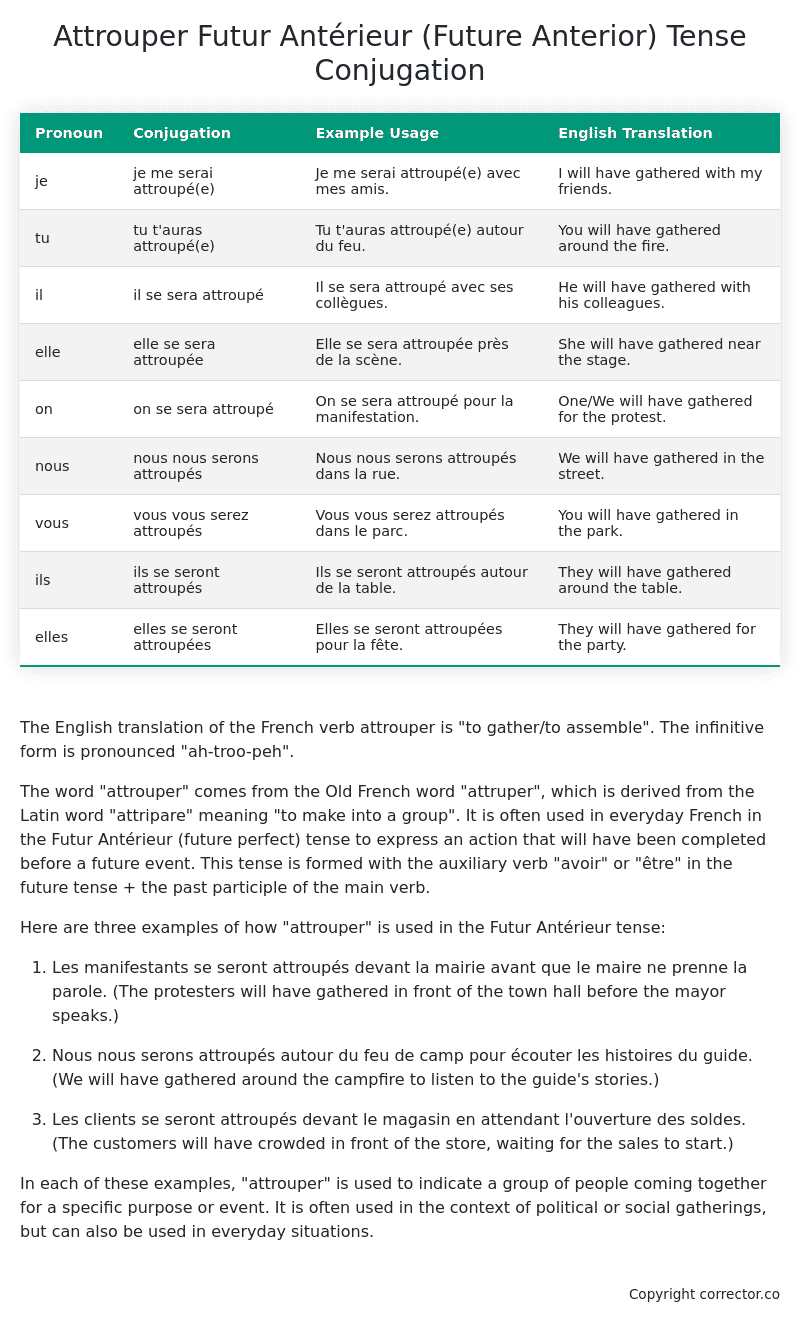Futur Antérieur (Future Anterior) Tense Conjugation of the French Verb attrouper
Introduction to the verb attrouper
The English translation of the French verb attrouper is “to gather/to assemble”. The infinitive form is pronounced “ah-troo-peh”.
The word “attrouper” comes from the Old French word “attruper”, which is derived from the Latin word “attripare” meaning “to make into a group”. It is often used in everyday French in the Futur Antérieur (future perfect) tense to express an action that will have been completed before a future event. This tense is formed with the auxiliary verb “avoir” or “être” in the future tense + the past participle of the main verb.
Here are three examples of how “attrouper” is used in the Futur Antérieur tense:
-
Les manifestants se seront attroupés devant la mairie avant que le maire ne prenne la parole. (The protesters will have gathered in front of the town hall before the mayor speaks.)
-
Nous nous serons attroupés autour du feu de camp pour écouter les histoires du guide. (We will have gathered around the campfire to listen to the guide’s stories.)
-
Les clients se seront attroupés devant le magasin en attendant l’ouverture des soldes. (The customers will have crowded in front of the store, waiting for the sales to start.)
In each of these examples, “attrouper” is used to indicate a group of people coming together for a specific purpose or event. It is often used in the context of political or social gatherings, but can also be used in everyday situations.
Table of the Futur Antérieur (Future Anterior) Tense Conjugation of attrouper
| Pronoun | Conjugation | Example Usage | English Translation |
|---|---|---|---|
| je | je me serai attroupé(e) | Je me serai attroupé(e) avec mes amis. | I will have gathered with my friends. |
| tu | tu t’auras attroupé(e) | Tu t’auras attroupé(e) autour du feu. | You will have gathered around the fire. |
| il | il se sera attroupé | Il se sera attroupé avec ses collègues. | He will have gathered with his colleagues. |
| elle | elle se sera attroupée | Elle se sera attroupée près de la scène. | She will have gathered near the stage. |
| on | on se sera attroupé | On se sera attroupé pour la manifestation. | One/We will have gathered for the protest. |
| nous | nous nous serons attroupés | Nous nous serons attroupés dans la rue. | We will have gathered in the street. |
| vous | vous vous serez attroupés | Vous vous serez attroupés dans le parc. | You will have gathered in the park. |
| ils | ils se seront attroupés | Ils se seront attroupés autour de la table. | They will have gathered around the table. |
| elles | elles se seront attroupées | Elles se seront attroupées pour la fête. | They will have gathered for the party. |
Other Conjugations for Attrouper.
Le Present (Present Tense) Conjugation of the French Verb attrouper
Imparfait (Imperfect) Tense Conjugation of the French Verb attrouper
Passé Simple (Simple Past) Tense Conjugation of the French Verb attrouper
Passé Composé (Present Perfect) Tense Conjugation of the French Verb attrouper
Futur Simple (Simple Future) Tense Conjugation of the French Verb attrouper
Futur Proche (Near Future) Tense Conjugation of the French Verb attrouper
Plus-que-parfait (Pluperfect) Tense Conjugation of the French Verb attrouper
Passé Antérieur (Past Anterior) Tense Conjugation of the French Verb attrouper
Futur Antérieur (Future Anterior) Tense Conjugation of the French Verb attrouper (this article)
Subjonctif Présent (Subjunctive Present) Tense Conjugation of the French Verb attrouper
Subjonctif Passé (Subjunctive Past) Tense Conjugation of the French Verb attrouper
Subjonctif Imparfait (Subjunctive Imperfect) Tense Conjugation of the French Verb attrouper
Subjonctif Plus-que-parfait (Subjunctive Pluperfect) Tense Conjugation of the French Verb attrouper
Conditionnel Présent (Conditional Present) Tense Conjugation of the French Verb attrouper
Conditionnel Passé (Conditional Past) Tense Conjugation of the French Verb attrouper
L’impératif Présent (Imperative Present) Tense Conjugation of the French Verb attrouper
L’infinitif Présent (Infinitive Present) Tense Conjugation of the French Verb attrouper
Struggling with French verbs or the language in general? Why not use our free French Grammar Checker – no registration required!
Get a FREE Download Study Sheet of this Conjugation 🔥
Simply right click the image below, click “save image” and get your free reference for the attrouper Futur Antérieur tense conjugation!

Attrouper – About the French Futur Antérieur (Future Anterior) Tense
Construction
Common Everyday Usage Patterns
Interactions with Other Tenses
For example
Summary
I hope you enjoyed this article on the verb attrouper. Still in a learning mood? Check out another TOTALLY random French verb conjugation!


